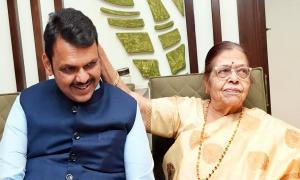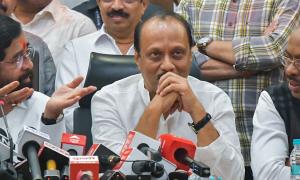The All India Congress Committee session in New Delhi on Saturday is all set to launch Rahul Gandhi as a youth icon.
The party managers, who are masters in the image-building exercise of the Gandhi-Nehru clan, are working overtime to give final touches to the strategy, which will have larger ramifications for the party's future.
However, there are a few hitches in their political mission because the AICC session of limited members (this is not a plenary or full session) is being held in gloomy times, when Prime Minister Manmohan Singh faces a grave crisis over the Indo-US nuclear deal. The party's commitment to secularism, coalition politics and independent foreign policy is under test.
Also, despite inflation coming under control, the price factor in the marketplace is not giving any relief to the people. Moreover, three years of the Congress-dominated United Progressive Alliance rule does not have enough achievements to catch the popular imagination on which Rahul Gandhi can have an easy and safe ride. Of course, the Prime Minister's Office would blame it on lack of publicity by the party machinery, but the fact remains that Congressmen are impatient and directionless.
Congress sees a Dhoni in Rahul Gandhi
For the Congress's PR managers, Rahul Gandhi is a 'work in progress' and Saturday is an important day to show off some initial results.
Asked what kind of image Rahul will carry in Saturday's session, a senior member of the party and Cabinet minister said, "Rahul is sincere; he is having a sense of innocence and idealism. He is a sharply focused leader and strongly believes in deliverance and output."
This may be the benchmark to project Rahul Gandhi while launching him in the centrestage of Indian politics of 2008-09, but on the field, Rahul Gandhi is not having an easy ride at all.
In his first Congress Working Committee meeting, he tried to bring in a fresh attitude in the registration of new members when, reportedly, he argued that there is an element of hypocrisy in the oath taken at the time of entering the party. The new Congressman has to take an oath that he will never consume alcohol, always wear khadi, and subscribe to an unimaginative publication, Sandesh.
Rahul was quite right, but when it was pointed out that by arguing like this he was taking on the ideals of none other than Mahatama Gandhi himself, he had to quickly clarify that he wasn't opposed to khadi at all.
"I always wear khadi and feel comfortable in it," he said. Before the khadi controversy he had to retract, clarify, modify or dilute his statements on the creation of Bangladesh, Babri Masjid, P V Narasimha Rao and the Nehru-Gandhi family.
But, as everyone knows and as all Congressmen accept meekly, the Congress party's survival strategy and electoral tactics solely revolve around the Gandhi family, so Rahul has the genuine support of the grand old party.
Congress managers claim that, notwithstanding the debacle in the recent assembly elections in Uttar Pradesh, Rahul Gandhi remains unscathed. Of course, it's equally true that the party doesn't have any other option and precisely because of this, the Congress's young brigade is setting its eyes and pinning its hopes on Rahul Gandhi.
'We want Rahul to play meaningful role in Congress'
"The AICC meet on Saturday has the potential to turn historic if Rahul Gandhi finally decides to come out of his fortress-type bungalow on Tughlaq Lane and take on the country's challenges head-on. He should give an aggressive speech to liven up the spirit of young Congressmen," a young Congress leader, seeking anonymity, told rediff.com.
A leader whose grandparents also worked for the Congress party says, "Soniaji had said in October that Rahul Gandhi must prove himself if he wants to become India's prime minister. Who is asking for evidence? We don't need any more credentials beyond the Gandhi surname but, surely, we want action." This young politician has been trying to get into the good books of the Gandhi-Nehru scion.
Talking exclusively, and in a hush-hush tone, a young Congressman from northern India says, "The problem with Rahulji is that he is not accessible. He is depending too much on a couple of his assistants and computer print-outs. That reminds us of R K Dhawan and M L Fotedar [Rahul's grandmother, former prime minister Indira Gandhi's confidants]. It is worrying us."
Citing an example, he said recently there was a cricket match between the National Students Union of India and the Youth Congress.
"We were quite surprised to see how dependent Rahul was on his personal assistants. He was with us for almost half a day. We got the chance to observe him closely. We were surprised when we saw that our leader's, our future prime minister's request to his assistant Kanishka Singh to play cricket was disregarded in public. We were quite uncomfortable to face such moments."
Rahul will face a complex situation while establishing his leadership. The timid mindset which has been developed over the years in the Congress, which attaches a premium to loyalty and sycophancy, will be hard to counter. The darbari culture, which Rahul seems to be allergic to, can't be genuinely replaced without his own credentials coming under scrutiny. Rahul Gandhi will have to be less and less radical as he establishes himself.
Right now, he has certainly fired the imagination of the party's young crowd. They are itching to support him.
Recently, Rahul Gandhi held a closed-door session at the Teen Murti Bhavan in New Delhi where he heard out his party's young leaders. It was a free and fair discussion on all aspects of reviving the party. In such sessions ideas to attract young people are debated in detail. In an effort to reach out to the youth and expand the party base, Rahul Gandhi has suggested that the minimum age for becoming a member of the party be lowered from 21 to 18. The decision was taken at the first Congress Working Committee meeting Rahul Gandhi attended following his recent induction into the party's highest-decision making body.
At the Teen Murti Bhavan session, Rahul Gandhi tried to be friendly with delegates and even shared Nathu's [a famour Delhi caterer] readymade lunch packets, but the negative tag of being a 'reluctant leader' is unlikely to go away, claim even his admirers.
In a surprise statement in that closed-door session, Rahul Gandhi had asked young Congressmen to create a network of reliable young people all over India, much on the lines of the Rashtriya Swayamsevak Sangh. His idea is to establish a permanent communication line to percolate party news faster and reliably.
Even as such ideas are welcomed by youngsters, Rahul's ardent supporters in the party think that "jab tak woh public ko nahi milega kuch nahin hoga (unless he mingles with the common man, nothing will move for him)."
Aware of the public's demands, Rahul Gandhi is slowly learning the tricks, too.
Recently, in Lucknow, when journalists showed their irritation when two Congress leaders were answering questions being put to him, Rahul Gandhi intervened to say, "I will answer all your questions."
"You people think I don't know how to speak. Now, let me show you how I speak," he said.
Come Saturday, young Congressmen gathered in the capital from every nook and corner of the country will judge if Rahul Gandhi has indeed learnt how to speak.








More from rediff